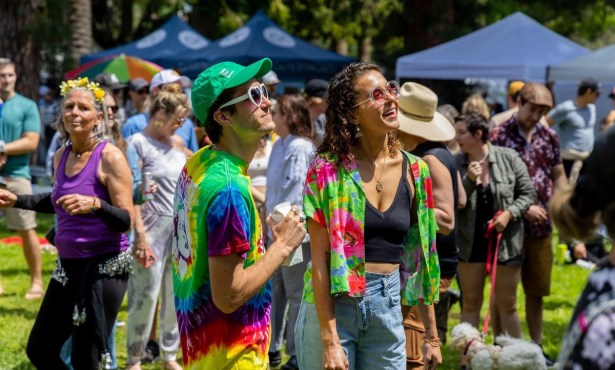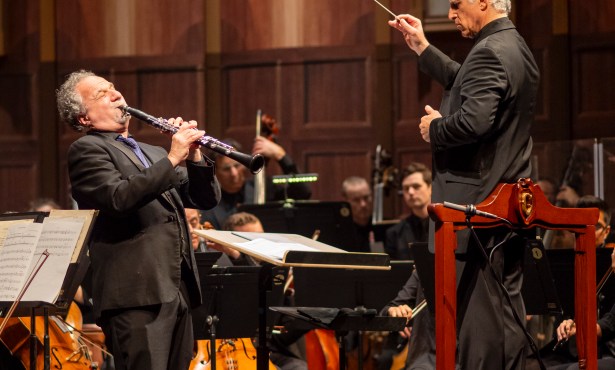Sublime Pianism, X Two
A One-Two Punch of World-class Virtuosity in Santa Barbara from Pianists Sir Stephen Hough and Daniil Trifonov

Last week on the Santa Barbara classical music landscape, lighting struck twice. In a rare case of cross-organizational serendipity, we were granted an audience with two of the world’s greatest living pianists in the space of consecutive nights.
Thursday’s virtuoso in the house was British master Sir Stephen Hough, presented by CAMA at the Lobero Theatre, while an even more thrilling and probing evening awaited from young Russian sensation Daniil Trifonov, who paid his third visit to Campbell Hall on Friday night, through the aegis of UCSB Arts & Lectures. This special accidental double header of sublime pianists gave Santa Barbara the feel of a highly-cultured city of a much bigger size for roughly 26 hours.
For a bit of backdrop, Hough was making his fifth CAMA-enabled appearance since 2005 (and his first local show in five years). He became a McArthur “genius” in 2001 and was named for knighthood in 2022 by Queen Elizabeth. He has earned ample acclaim for his innate and yet understated virtuosic touch and broad interests in terms of musical eras and idioms, while also serving other muses as a composer, poet, essayist, and now novelist.
His latest Lobero program attended to the more standard rep business of airily lyrical Debussy (Estampes L.100), volatile and antic Scriabin (Sonata No. 5, all pyrotechnical density) and a dramatic plate of Lizst-omaniacal bravado (from Annees de pelerinage: Italie) to close. And yet the most interesting music of the night came from lesser-traveled corners of the piano literature. Hough has recently become a champion of the underrated Spanish composer Federico Mompou, whose mildly eccentric delicacies have earned him the sobriquet “the Spanish Satie.” Hough beautifully celebrates Mompou’s solo piano music on his recent album Musica callada and the pianist opened the concert — in a floating gentle way rather than with brash brushstrokes — with the enigmatic miniatures of Mompou’s “Cants magics.”
To open the Lobero concert’s second half, Hough demonstrated his own impressive insights as composer, with the accessible five-movement work Partita, from 2019. Outer movements proceed with knottily exuberant waves of energy, while the inner three movements feed off of the modal meditations of fifth intervals, to an almost jazz-colored effect.
Friday’s fare at Campbell Hall upped the ante of pianistic profundity, in a way, in terms of witnessing a still-young-ish (Trifonov is 32) global phenom in this venue’s intimate space, and with a program which, while fairly traditional on paper, rose to transcendent heights through Trifonov’s eloquent renderings.
Trifonov’s poetic approach and embrace of the music at hand, sometimes reminiscent of Sir Andras Schiff with his blend of nearly mystical focus and technical command at-the-ready, opened in captivatingly hushed tones with the opening of Jean-Phillippe Rameau’s elegant “Suite in A minor, RCT 5.” Trifonov on Rameau — the French Baroque master deserving greater love and concert stage time — may have accounted for this concert’s deepest moments, although the pianist was equally at home with the orderly classical realm of Mozart’s “Piano Sonata No. 12 in F” and the dynamic challenges and mercurial turns of Beethoven’s famed “Hammerklavier” sonata filling the second half. The long program might have been more balanced without the gushing force of Mendelssohn’s “Variations serieuses,” which felt out of place here.
Just when we had accepted Trifonov’s mastery in various classical piano modes, he unleashed an astonishing burst of genuine jazz fluency, riffing with Oscar Peterson-esque flourish on the theme of “I Covered the Waterfront” — though teasingly avoiding the melody proper. Ovations in the hall brought him back to the piano for a calmer final encore, a ruminative movement from Scriabin’s “Third Piano Sonata.”Voila, Scriabin turned out to be the common ground between Hough and Trifonov, two exemplars of the continuingly relevant, adaptable and potential mind-blowing culture of the piano recital. Here were two heroic yet deeply musical cases in point, in our midst and vying for spots in the Best of the Year list, Santa Barbara classical music division.



